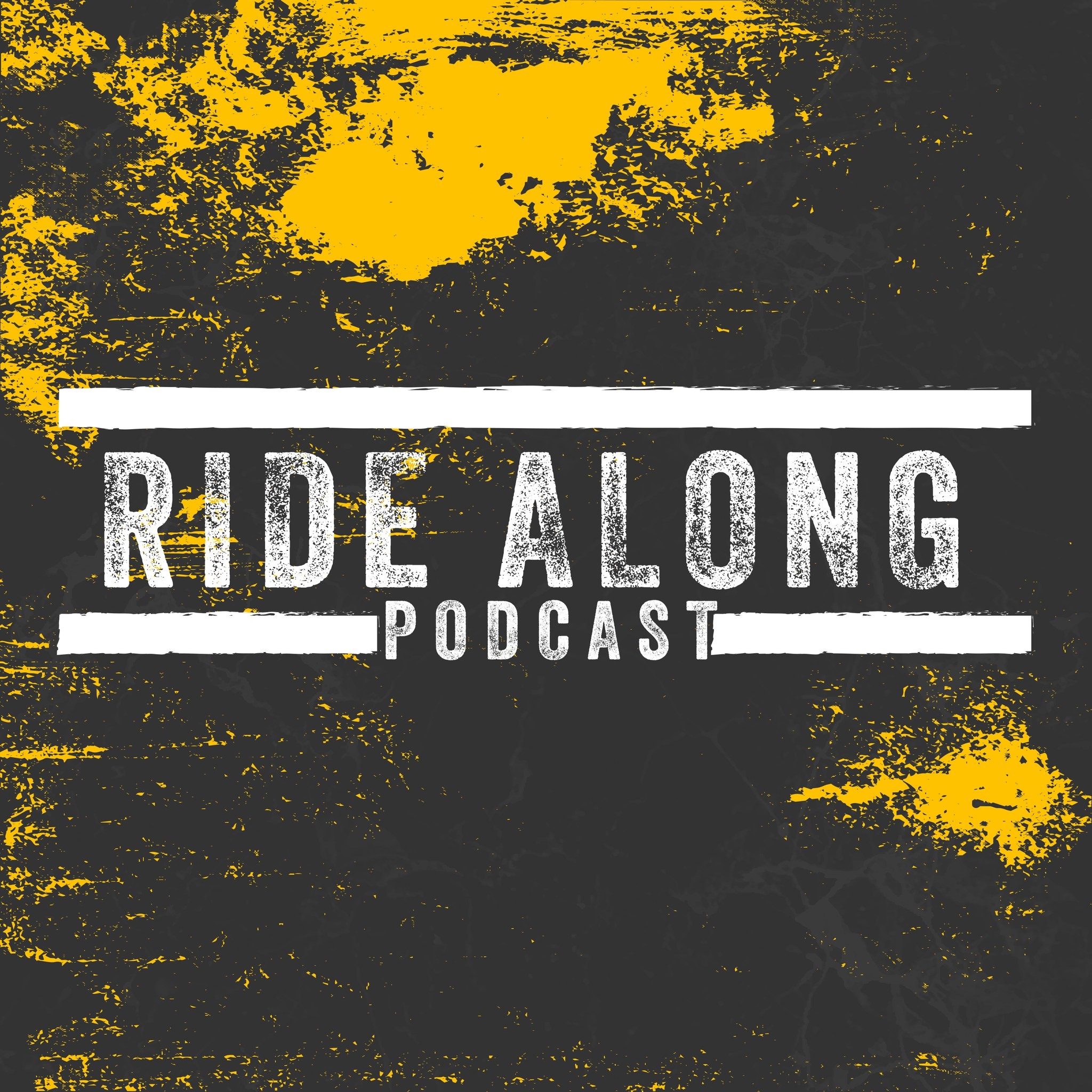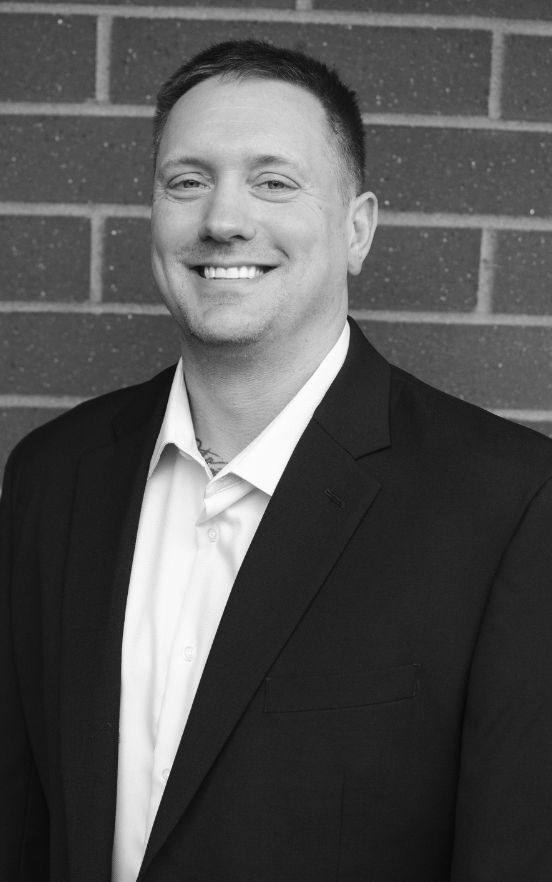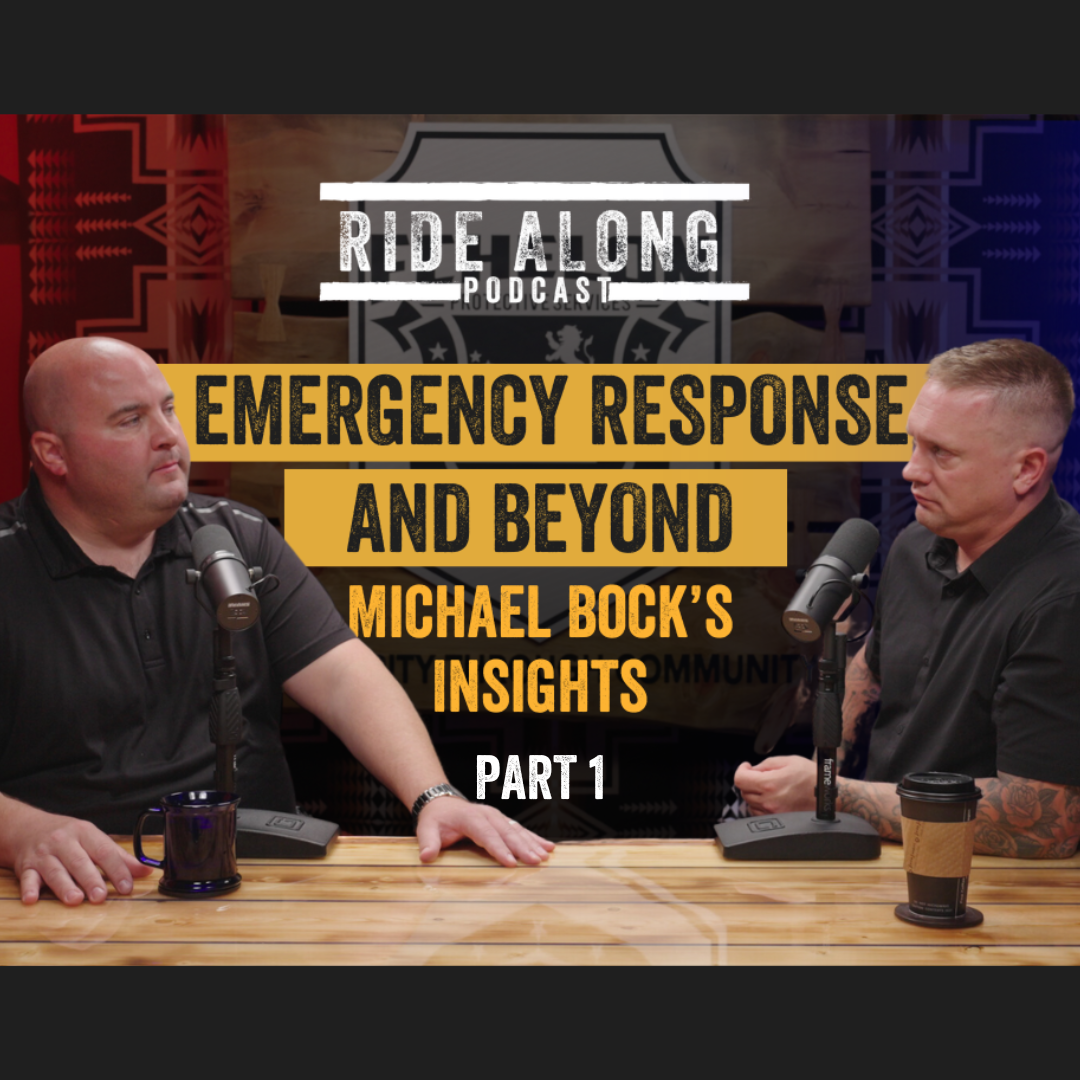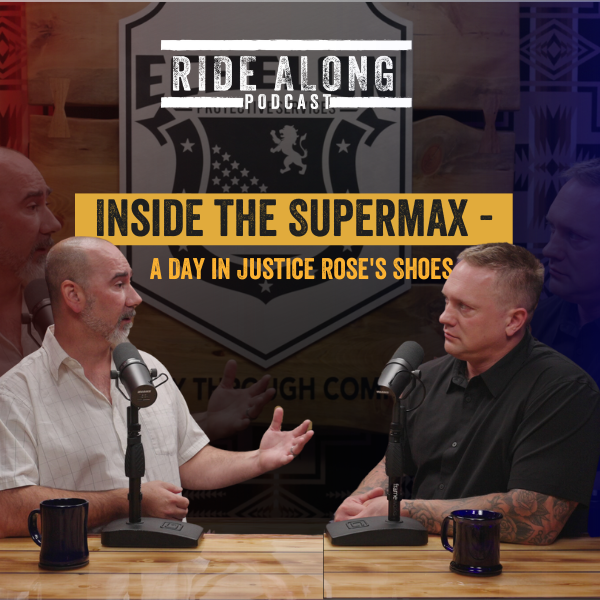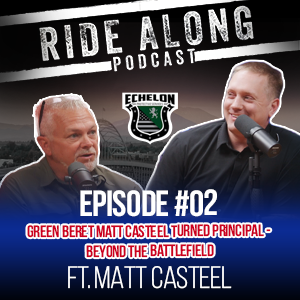Episode Transcript
[00:00:02] Speaker A: I'm Alex Stone, former military service member and law enforcement officer, now CEO of Echelon Protected Services, one of the fastest growing private security firms on the west coast. And this is ride along, where our guest and I witness firsthand the issues affecting our community.
I believe our proven method of enacting meaningful change through compassion and understanding is the best way to make our streets a safer place and truly achieve security through community.
Hey, Alex Stone here. Welcome to the Ride along podcast brought to you by Opsec Media Group. I'm Alex Stone, your formidable host. I have an amazing gentleman in the house today, Joey Langford. He is not a felon, but he's a farmer with felons. We're going to get all into that later.
Joey, why don't you introduce yourself to the folks?
[00:01:01] Speaker B: Yeah. My name is Joey Lankford. I am a husband to Courtney, father of five and born and raised in middle Tennessee. Except for some time I spent over in South Africa, which we'll probably get into that a little bit later too, as well.
[00:01:15] Speaker A: So in the middle of Tennessee, or middle Tennessee is a town.
[00:01:18] Speaker B: It's the middle of Tennessee.
It's like 15 minutes south of Nashville. So a lot of country music, it's what we're known for, but have just, you know, when you're born somewhere and you lived, live there your entire life, sort of home to you. So that's where we.
[00:01:34] Speaker A: So side story. We're getting a side story at the beginning. Yeah. So I come up to visit you. My wife wants to go to the country music museum. They have an entire display, a whole wing, if you will, an education center on Taylor Swift.
I was stuck in there for like 3 hours. So, gentlemen, beware. If your wife likes Taylor Swift and you're going to Nashville, make sure that you have a very long Zoom meeting scheduled. Absolutely.
[00:02:05] Speaker B: She's a local celebrity for sure. Oh, yeah, national celebrity.
[00:02:08] Speaker A: Yeah. Great. So Joey, you're up here this week, you're visiting a farm, right?
[00:02:15] Speaker B: Yeah.
[00:02:16] Speaker A: Why are you visiting a farm? Give us your background.
[00:02:18] Speaker B: What do you know? I came into farming out of healthcare in 2010. My wife and I had three children biologically. And then she came to me and wanted to adopt a baby. And so we adopted a little girl from Ethiopia.
[00:02:31] Speaker A: Awesome.
[00:02:32] Speaker B: Bristol's 13 now. She was ten months when we got her that trip to Ethiopia. I really remember just picking up Bristol and then coming home, and then Courtney and I's discussions in our early thirties were like, that was really fulfilling to leverage our lives for something that was way bigger than us. And then to be able to see that come back into our home and the resources that we've been given to really be able to apply those to affecting other issues. Little did we know that 18 months from that time, we would sell everything and move to Cape Town, South Africa.
[00:03:07] Speaker A: And so from middle Tennessee to South.
[00:03:09] Speaker B: Africa to Cape Town to work in one of the local ministry there that was set up through one of. Through one of President George W. Bush's PEpfAr funded, or USAID organization. So it was to combat aids there. Yeah, USAID. Exactly. That's what it was. And we landed right there on the peninsula south of Cape Town, and we got a three year volunteer visa. Initially, we ended. Ended up staying five years. And upon going there, I ran into zimbabwean farmer, actually had fled Zimbabwe on asylum seeker papers, and he had set up a farm with greenhouses. They call them tunnels there, which confused me when I first got there. But he had some trouble financially, and he was getting out of that particular business. And so we bought a couple of his greenhouses and relocated them to outside of a township called Masapumalele. And Maspumulele was 45,000 people on 1 sq. Mi.
[00:04:05] Speaker A: So for people out there who don't know, townships typically have extreme levels of poverty.
[00:04:10] Speaker B: Extreme. And, you know, I tell people that, Alex, it's like the purest cross section I've ever seen. But between the wealthiest people in the world coexisting with probably the poorest people in the world. It's a real controlled township is just basically a place that has been set aside for all of the. Socially.
[00:04:29] Speaker A: We can call them a reservation.
[00:04:31] Speaker B: Yes, exactly.
[00:04:33] Speaker A: Reservation system.
[00:04:35] Speaker B: Yes. So we.
[00:04:36] Speaker A: That was adopted through apartheid.
[00:04:38] Speaker B: Exactly. And we lived there for five years, and we took it to 13 greenhouses with a tomato growing operation, of all things. And we started that with a market contract for, like, a local whole foods in the area called food lovers market. And we just began to distribute crown on tomatoes, fresh, unrefrigerated, to the upper income stores in the area where they could be bought.
[00:05:03] Speaker A: And so prior to going to South Africa. No, you were not a farmer?
[00:05:08] Speaker B: I was in healthcare. But you can probably tell just by my accent and where I'm from, I love. I love being outside.
[00:05:14] Speaker A: You know, not everyone in Tennessee is born a farmer.
[00:05:17] Speaker B: No, no.
[00:05:18] Speaker A: Good.
[00:05:18] Speaker B: Very few actually are born farmers. So, you know, I was born loving the outdoors.
[00:05:23] Speaker A: Yeah.
[00:05:23] Speaker B: You know, I freaking love this place here because of that, you know, just my limited time here, I'm like, northwest is amazing.
[00:05:30] Speaker A: It is amazing.
[00:05:31] Speaker B: I could spend a lot of time here, but, yeah. So Cape Town was a lot like this as far as geographically. You got the mountains and the valleys and Seal island and all these geographic just wonders. Table Mountain was right out our window, so we could see one of the major, major geographic landmarks for planet Earth. And so we lived and existed there. And then while we were there, my wife got pregnant. So we had another baby there, took four, brought back five. But in 2016, 1516, early 15, we started sensing that we wanted to. The end goal was to turn it over to those that we had trained. Right. And so I was fortunate enough to be able to recruit.
Through a documentary film that was done, you know, about our family and a book that I wrote with lifeway, I was able to recruit four or five people that were exiting college with agronomy degrees and accounting degrees and computer science to come to South Africa and help me build that. So once we got ready to leave, we sort of. I left first, and then that team continued to leave until it's run.
[00:06:39] Speaker A: So you mentor the team? Mentored the team in place.
[00:06:41] Speaker B: Yes.
[00:06:42] Speaker A: And that was your golden parachute?
[00:06:44] Speaker B: That was like.
[00:06:46] Speaker A: Not really golden parachute, but, yeah, it was for me.
[00:06:49] Speaker B: It was for me, it was like I knew, you know, once I. Once I. The opportunities or saw that we had some winds of change within the organization that they internally had embraced it there in South Africa, you know, and we're ready to move it forward.
It was just, I'm entrepreneur, I'm a pioneer, you know, I'm very geared, very entrepreneurial.
[00:07:09] Speaker A: The money's earned through this, I guess, social enterprise.
[00:07:12] Speaker B: Yes.
[00:07:12] Speaker A: Did it go back to the township?
[00:07:14] Speaker B: How did that it goes to. It was pay for all of the people in the academy. So we set up a full blown training.
[00:07:20] Speaker A: You were able to give livable wages and jobs.
[00:07:23] Speaker B: Yes.
[00:07:23] Speaker A: To the. To the members of this extreme, extremely impoverished township.
[00:07:28] Speaker B: Yeah.
[00:07:29] Speaker A: And transformative, really.
[00:07:30] Speaker B: Very. And in my own life, you know, it was like an MBA or a doctorate in poverty, just being steeped that, I mean, literally right across the road, living, you know, on a hill across the road in a very home that looks much like ours does now, but also looking down on that kind of poverty every day and having to interact with it was so educational for me. When I got ready to come back home, you know, my wife and I had prayed about it. We're faith people, so it's just like, you know, let's just see what we feel like we're supposed to do. I didn't want to go back. Just didn't feel like you know, we want. I wanted to go back into the corporate world. I just, you know, there's a lot of opportunity, and like I said, I'm a pioneer and, you know, make money. Making money, you know, for me, is like, that's a fun thing to try to do, you know. Yeah. And people like you and I are wired that way. But, you know, it was. We felt really impressed that we were, we wanted to stay in food. So I had built a relationship with the governor of Tennessee at the time was Bill Haslam. And I, when I got back, had just contacted him through, you know, and we had been in touch before, but begin. Begin to ask the question about, you know, is there any underutilized land maybe that we could use to engage the underserved, socially underserved in Nashville with a workforce development program that included all things agric. So, like forestry, hospitalities, even, you know, the end user with food and purveying food. Food safety is a big deal. So we trained the food safety certifications, setting up, little by little, this program, six, seven years ago. Now time flies. You know, that, but.
[00:09:06] Speaker A: And the name is on your head.
[00:09:07] Speaker B: The name is on my highest cultivate. You know, it's. And what was crazy about it is, you know, if somebody would have pointed a gun in my head and said, you know, what are you doing this for? I would have said, you know, I probably to engage the generationally unemployed or underemployed, you know, like just in our. In our cities. So let's say, you know, just trying to find points of maybe relational currency and then go in and try to set up farming education and get people at a place where we get the relationship right. But I'll never forget when I got my stuff done with the ag department. So, cultivates the only.
Tennessee has the only ag department in the United States with a working farm on it, and that's cultivate. So that was. We didn't even know that.
[00:09:51] Speaker A: All 50 states, all departments of agriculture in those states.
[00:09:55] Speaker B: Yeah.
[00:09:55] Speaker A: You're running the only social, the private public farm as a part of the Department of Agriculture?
[00:10:01] Speaker B: Yes. Within collaboration with the government. And what I mean by collaboration is the educational components and the assets. So the land, the eight acres that we farm, the buildings that we use, the training kitchens that we use for training, you know, all of those toward the facilities.
[00:10:14] Speaker A: These are nice facilities.
[00:10:16] Speaker B: Yeah, it's very nice. We've been. We've been really, really fortunate and blessed.
[00:10:20] Speaker A: Who do you hire?
You know, how did you.
[00:10:24] Speaker B: And I laughed about this when you were at the farm. But, you know, my first encounter was with a dude that chased me down, and his name is Chris Comstock. You know, if you go on the web, you can find a story. But he just literally came to me and said, I just did. I got out of seven years of prison, and he said, I got a wife, and I got two kids, and I'm working at Chili Burrito, and I've got this ceiling, like, over me. Like, I can't. And I pressure wash, and I can't.
[00:10:47] Speaker A: Get into middle class on minimum wage. You can't do that.
[00:10:50] Speaker B: And he was looking at me like, there's my truck. There's my pressure washer. Like, I'm not. I'm not a guy that doesn't want to work. Like, I want to work. And I remember seeing Chris is one of my best friends now. I was like, well, if you want to work, we got a four plank fence that we got to start putting up around this farm. Nice. So we literally.
[00:11:05] Speaker A: There's always work on a farm.
[00:11:06] Speaker B: And he and I just started getting. And, you know, farm work is just. It's relational. Right. So we were just out there.
[00:11:13] Speaker A: You're relating to the ground, the earth, and it relating to each other.
[00:11:16] Speaker B: Yeah. And farming itself neutralizes any hierarchy in the. Like, I'm just another dude. You know, when you're driving now through.
[00:11:23] Speaker A: Harvest season, everyone's harvesting, right.
[00:11:26] Speaker B: If you're milking cows, everyone milks. You know, like, there's no, hey, this dude's sitting over here because he's the boss. Right. It's just. It's a very. You know, and I think, in a lot of ways, work is probably the greatest relational tool that we have for connecting with one another. Cause, you know, when you get down to it and you start really applying your expertise, your back, your whatever, to something together, it sort of neutralizes.
[00:11:47] Speaker A: Yeah. You have shared mission, vision, values, and goals.
[00:11:49] Speaker B: Exactly.
[00:11:49] Speaker A: So you're building team.
[00:11:51] Speaker B: Exactly.
[00:11:51] Speaker A: In the middle of all that, which is relational. Right.
[00:11:54] Speaker B: Yeah. And I got to know Chris and then. So let's fast forward a bit. So. But it started growing a bunch of food, and we give our food away. You've seen the model, but it's basically, we sell half of it, and we give half of it away.
[00:12:07] Speaker A: Storehouses of food. Food upon food upon food. Rooms of food.
[00:12:11] Speaker B: Yes. Yes. We're now amazing. We're now up to 300,000 pounds a year of all fresh produce. That's going to acute hunger and natural.
[00:12:19] Speaker A: What percentage of your workforce would you say are people coming out of prison. Every person, every single person out of.
[00:12:27] Speaker B: Prison or out of an acute addiction of some sort that they're dealing with through a halfway house. They have a residence and they have to have transportation. So those are two components of our program that we don't provide. And, you know, if you see some of our merch or even in my name, that letter two is a tagline for growing food, growing people. So missionally, we're growing. We're growing food for the acute hunger, you know, food deserts in and around Nashville, which we have a lot of gaps in. Just inequality there.
[00:12:55] Speaker A: Yeah.
[00:12:55] Speaker B: But then talk about using.
[00:12:56] Speaker A: How. How is it possible that major cities can have economic zones experiencing food scarcity? How is it. Where in the supply chain or in economics of that, can that, can that occur?
[00:13:09] Speaker B: I think it occurs if you look at just what I've seen since I've been back from. From Africa happening in my own hometown. I think it occurs because, um, these cities are growing. You know, these communities, they're. They're really moving people around. Um, just like you said, we call it reservations or townships. Basically, it's a money game.
[00:13:32] Speaker A: You're constantly redeveloping.
[00:13:34] Speaker B: Exactly. Improvising, improving, rezoning. Yes. And it's just. It's displacing and it's displacing. And, you know, finally you get them.
[00:13:44] Speaker A: You know, over time, there are people that, as this displacement occurs, occurs of wealth, and wealth is moving the money and the capital around. People lose housing. Right? They lose. Yeah, yeah, they lose it. They do mean they.
[00:14:02] Speaker B: They're the. They're the. They're the. They're the lowest bidder in the game.
[00:14:05] Speaker A: Of, you know, they're at the bottom.
[00:14:07] Speaker B: Of because they can't bid the land, they can't build the development. The development crisis that exists in some of these cities with just the pure need of. For ground and for parking and for this, you know, and then once they've been there since the sixties and seventies or eighties, you know, or whatever, and then basically in the. In the. In the folks that, you know, become my best friends, the ones that have been. We've been able to bless their, cultivate, you know, it's that once they get out, they can't pay enough to live. They don't make enough to live in a place that. And it's.
[00:14:38] Speaker A: You can't get to middle class on.
[00:14:40] Speaker B: It's like every time, you know, they turn around, they're getting punched in the face again. And. And when you build the relational currency with these individuals, you begin to be. I'll tell you this. I've become way more empathetic myself to the plights of those who have been in prison or who have been addicted horrifically to something because of a trauma in their life or whatever. I told my wife even the other day, I said, it's still amazing to me that we've been doing this for 13 years, and I'm still so full of judgment sometimes. It's just like, I look at situations and I'm like, you know, but then you walk a mile. You ever heard, like, walk a mile in somebody shoes when you sit down with an individual and you hear how they got into ten years of prison or whatever, you're like, I mean, I would have been the same place.
[00:15:24] Speaker A: Yeah, well, you tell someone, hey, I really need you to pull yourself up by your bootstraps and get this done. And they're like, yeah, I've been addicted to heroin for seven years.
[00:15:36] Speaker B: Yeah. I don't even know.
[00:15:37] Speaker A: What is that?
What does that look like for that person to reengage. Right. And to normalize and to socialize.
[00:15:45] Speaker B: Yeah.
[00:15:45] Speaker A: It's. It is a big process, and I deal with that a lot.
[00:15:48] Speaker B: Sure.
[00:15:48] Speaker A: In the work we do.
[00:15:49] Speaker B: Sure.
[00:15:49] Speaker A: And I.
I think that I'm. I parallel your. Your levels of judgment sometimes.
[00:15:56] Speaker B: Yeah, sure.
[00:15:57] Speaker A: Because I grew up in foster care. I grew up on the street. I grew up homeless. I grew up, you know, having to go to school and fight every day, literally get into physical fights. Right, right. I. And, you know, people are always. They know they're. They people can. I think people just assume that everyone has the same level of IQ and emotional in EQ.
[00:16:24] Speaker B: Yeah.
[00:16:24] Speaker A: That, you know, all things being equal. Well, you should just be able to make your life better.
[00:16:29] Speaker B: Right.
[00:16:29] Speaker A: But some people can't even. Don't even have the acumen to be able to plan their life right. Beyond two or three days. Yeah.
[00:16:35] Speaker B: Without the community, without. Without a team, whatever that community is, without a team. Just like you build your business, just like we've built this nonprofit, you know, you got to prioritize your team. You got out of a strategy they have. Nobody know.
[00:16:49] Speaker A: They don't know how to do that. They've never been taught to prioritize and.
[00:16:52] Speaker B: Exactly.
[00:16:53] Speaker A: They never taught that.
[00:16:54] Speaker B: Right. Just to stay sober one more day, you know, that's the biggest thing on the circle, like, and it's literally gripping every ounce of energy that they have or, you know, and I think your question, I think that got us down this rabbit hole was like, why am I here? You know, and we had the privilege of being contacted by a farm that's, that's here that has some really ambitious goals, and I love ambitious goals, like.
